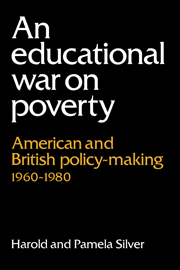Book contents
- Frontmatter
- Contents
- Acknowledgments
- List of abbreviations
- 1 Introduction: a proper complexity
- Part I A pattern of events: United States
- Part II A pattern of events: Britain
- Part III Following through
- 12 United States: planned and unplanned variation
- 13 Britain: units of concern
- 14 Directions
- Interviews and consultation
- Bibliography
- Index
13 - Britain: units of concern
Published online by Cambridge University Press: 03 October 2009
- Frontmatter
- Contents
- Acknowledgments
- List of abbreviations
- 1 Introduction: a proper complexity
- Part I A pattern of events: United States
- Part II A pattern of events: Britain
- Part III Following through
- 12 United States: planned and unplanned variation
- 13 Britain: units of concern
- 14 Directions
- Interviews and consultation
- Bibliography
- Index
Summary
Following the Plowden report the British government made its shortterm allocation for building purposes in priority areas, cautiously invited local authorities to recommend schools where teachers would be eligible for a special payment in recognition of exceptional difficulty and, under the Urban Programme introduced in 1968, included expenditure on education, notably nursery education. The concept of educational priority areas was widely accepted by the local authorities, and commitments to identifying and supporting schools were strong in many parts of the country. Situated amongst these developments was a national EPA ‘programme’ under which five ‘projects’ were located in England and Scotland, financed jointly by the Department of Education and Science and the Social Science Research Council. The programme was negotiated primarily by Michael Young, who had been on the Plowden Committee and was chairman of the SSRC, A.H. Halsey, Director of the Department of Social and Administrative Studies at the University of Oxford, and the Secretary of State for Education and Science, Anthony Crosland, to whom Halsey was at the time a part-time adviser. The EPA projects grew directly from Plowden, against an American background.
‘We all began with a Plowden orientation’, wrote Halsey in one place. The aims of the projects – to raise the educational performance of the children, to improve teacher morale, to increase the involvement of parents in their children's education, and to strengthen the role of schools in their communities – were, he wrote elsewhere, ‘ directly derived from Plowden’ (B: Halsey, in Morrison et al., 1974, ix; Halsey, 1972a, 57).
- Type
- Chapter
- Information
- An Educational War on PovertyAmerican and British Policy-making 1960–1980, pp. 287 - 317Publisher: Cambridge University PressPrint publication year: 1991



